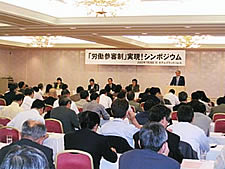Citizen-Participation Trial Symposium Held
(8 Aug 2003)
Topics fervently covered at the symposium included, discussion over the possible introduction of a labor participation system by the Cabinet’s Office for the Promotion of Justice System Reform’s Labor Consultation Group, RENGO’s activities to implement such a system, the introduction of expert’s opinions, and the need for a system where troubled workers can exercise their rights without suffering in silence. The Labor Consultation Group is scheduled to form an interim report in the first week of August, a final report in November, and submit a bill at the ordinary Diet session next year.
 |
| Photo: GS Kusano appealed to attendees to “Support activities for a citizen-participation trial system!” July 28, Tokyo. |
Discussants included RENGO Vice President Tsuyoshi Takagi (UI ZENSEN DOMEI: Japanese Federation of Textile, Chemical, Food, Commercial, Service and General Workers’ Unions President), Office for Promotion of Justice System Reform’s Labor Consultation Group member; Yoshiaki Ukai, a lawyer and Consultation Group member; and Senshu University Law Professor Katsutoshi Kezuka. Each spoke from their own point of view for the necessity of a labor-participation system.
Many reports and suggestions were presented during the discussion and RENGO Vice President Takagi informed those in attendance that Nippon Keidanren (Japan Business Federation) and the courts opposed the introduction of the labor-participation judicial system during a Consultation Group debate. Takagi said that “many workers that find themselves in trouble suffer in silence. We must create an accessible system to change this situation right now.” Attorney Ukai emphasized the need for speedier labor trials. For that purpose he said we need: [1] earlier disclosures of evidence, [2] fostering judges with expertise in labor cases and, [3] the introduction of easy-to-fill-out complaint forms. Speaking from an academic point of view on the role of labor unions, Professor Kezuka indicated that “Japan is a society where the legal and social cultures are clearly separated. Labor unions have a social responsibility to create a legal culture through a labor-participation system and change the legal/social division.”
Questions and opinions raised from the floor included the relation between new quasi-judicial institutions and conventional labor committees and the following was asked by an attending academic. [1] A labor-participation judicial system should be introduced into lower district courts, since if a quasi-judicial organ were set before the lower court, practically speaking it would turn into a four-trial system. [2] The case of unions’ acting on behalf of individuals in lawsuits should be studied with regard to possibly speeding up litigation in the future.